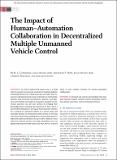,The Impact of Human-Automation Collaboration in Decentralized Multiple Unmanned Vehicle Control
Author(s)
Cummings, M.L.; How, J.; Whitten, A.; Toupet, O.
DownloadCummings-How-IEEE.pdf (639.7Kb)
Metadata
Show full item recordAbstract
For future systems that require one or a small team of operators to supervise a network of automated agents, automated planners are critical since they are faster than humans for path planning and resource allocation in multivariate, dynamic, time-pressured environments. However, such planners
can be brittle and unable to respond to emergent events. Human operators can aid such systems by bringing their knowledge-based reasoning and experience to bear. Given a decentralized task planner and a goal-based operator interface for a network of unmanned vehicles in a search, track, and
neutralize mission, we demonstrate with a human-on-the-loop experiment that humans guiding these decentralized planners improved system performance by up to 50%. However, those tasks that required precise and rapid calculations were not significantly improved with human aid. Thus, there is a shared space in such complex missions for human–automation
collaboration.
Date issued
2012Publisher
Proceedings of the IEEE
Citation
Cummings, M.L., How, J., Whitten, A., and Toupet ,O.,The Impact of Human-Automation Collaboration in Decentralized Multiple Unmanned Vehicle Control, Proceedings of the IEEE, Vol. 100, No.3 pp. 660-671, 2012.
Keywords
Command and control, decentralized task planning, decision support systems, human–automation interaction, human supervisory control, unmanned vehicles